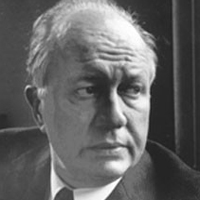Elegy for Jane by Theodore Roethke: Summary and Analysis
Elegy for Jane by Theodore Roethke is an elegy by a teacher on the untimely demise of one of her students; Jane. The girl, Jane, was thrown by a horse, resulting in her untimely demise. It blends the tone of nostalgia, sympathy, love and moral dilemma. The speaker in this poem is the teacher of the dead girl, which shows the reader's curiosity about the nature of the relationship between the victim and the person telling the story.

Theodore Roethke (1908-1963)
The teacher finds himself impacted by the accidental death of Jane and in her absence, he finds himself separated from soft smile, close interaction, and Jane's singing. Still today, the speaker recalls physical movements and gestures of Jane. She was always balanced in the delight of her thought. She would give a quick look and soft smile to the teacher. Even the teacher would deal with her kindly and gently. He couldn't speak harshly and roughly to Jane. The little girl Jane used to sing songs. Her song would shake the twigs and small branches. Even the shade would sing with her. Her power of voice would make the leaves turn to kiss her. The shade always sang with her and the leaves of the tree always turned to kiss her. Similarly, mould under the rose would sing with her. When she was sad, she did throw herself down into a pure thought. Nobody could find her when Jane was in despair. In her sadness, even a father could not find her. In her depression, Jane would lie in straw and cry strongly, evoking images of extreme emotion. Some pressures and tensions would drive her to the optimum level of frustration. Sometimes Jane looked really pretty and reddish.
The speaker does not find his sparrow i.e. sparrow is now no more waiting for a fern. The speaker is in a moral dilemma that he is in complete tragedy and no one can console him. The moss and the wet stones can't feel the sadness of the speaker. Like a pigeon, Jane has been lost somewhere in an unknown place. The speaker goes to the grave to speak the words of love and memory. But he is neither Jane's lover nor father. The speaker of the poem is a teacher. He was silently in love with Jane. When Jane was alive, he never felt such attachment. After the death of Jane, the teacher comes to feel some sort of absence, loss, lack and isolation. The use of repeated comparisons of the young girl to the plants and animals reinforces the theme of innocence in the poem. The speaker in the poem feels so hard to believe and accept the truth of the death of the young girl; so innocent, so pure and perfect.
In this elegy, the speaker uses both descriptive and meditative modes. Actually, Jane is still alive and fresh in his mentality. He wishes Jane to be alive again, but he himself knows that it is impossible. Coming to the grave, he speaks the words of love. This elegy ends in self-realization and self-actualization.
'Elegy for Jane' by Roethke is a monologue on the death of a student, by a teacher. This elegy is written, in free verse with a better combination of both descriptive and meditative modes of poetic composition. As an elegy, the lamentation of the speaker, his sadness and loneliness in realization at the end are available in this poem. To describe a young student, the poet takes the support of visual imagery from the nature. Most of the images directly refer to beautiful and lovely parts of the environment. Use of imagery, unique application of diction, conscious use of alliteration, use of unequal poetic lines and style of balladry are some of the stylistic aspect of this poem. To the speaker the student is very similar to a wren, sparrow, and a pigeon. He compares Jane to three different birds, which are always carefree, pleasure to look at, and innocent enough. Such unusual comparison heightens the importance of Jane in the life of the speaker. 'Small branches', 'bleached valleys', 'clearest water', 'sparrow', 'a fern', 'wet stones', 'the moss', 'damp grave' and 'tendrils' are some images used in this poem. Most of these images appeal to our sense of sight. On the other hand, 'wet stones', 'clearest water', 'damp grave' and then 'sad song' appeal to our sense of touch and sense of hearing. Availability of alliteration is another stylistic aspect of this poem. We commonly find alliteration almost in every line. Coming to the last point, the speaker raises a big question about the possibility of love between teacher and student. Such love most of the time comes under social criticism and moral consideration. The speaker feels sorry that he has no right to feel the absence of Jane because she is neither beloved to him nor he has parental authority upon her. In other words the speaker feels uneasy because he is not lover and father to lament over her death.
Related Topics
I Knew a Woman: Summary and Analysis
My Papa's Waltz: Summary and Analysis
The Waking: Summary and Analysis
 |
bachelorandmaster.com |